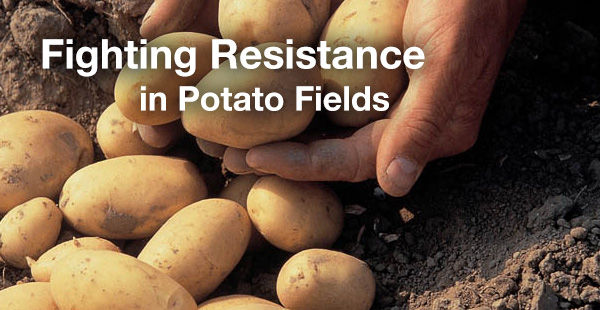Early Blight Tranquility Disease Resistance Meets Its Match
September 19, 2013

According to the USDA, potatoes contributed to about 15 percent of all vegetable sales in 2012. As the leading vegetable crop in the country, a vital part of the economy and an important commodity, they need to be protected, and researchers are beginning to identify resistance issues to diseases that can impact yields, like early blight.
Growers use fungicide rotations as a part of a comprehensive crop protection program, but across the country they are beginning to experience a loss of efficacy in certain fungicide chemistries. Widely used potato fungicides are becoming increasingly ineffective in controlling early blight.
With a decade of experience in potato research, Phillip Wharton, Ph.D. at the University of Idaho, focuses his efforts on bacterial and fungal diseases that affect potatoes in the state and across the country.
This issue caught his attention, and in response to complaints about the gradual loss of fungicide efficacy, Wharton tested levels of early blight resistance to fungicides containing strobilurin and boscalid chemistries. His research revealed early blight isolate resistance is present for both.
“When we see a loss of efficacy with any product, we want to know why,” said Wharton. “With growers complaining about a loss in effectiveness in strobilurins, we decided to test strobilurin resistance and thought that boscalid would make a good positive control. To our surprise, we actually found several isolates that were resistant to boscalid as well.”

Wharton then turned to testing fluopyram and pyrimethanil, the active ingredients found in Luna Tranquility® (1) fungicide from Crop Science. The chemistries provided complete control of early blight isolates in testing, offering a solution to resistance management issues.
“The good news is that we have not found any cross resistance to Luna Tranquility for early blight. All of the early blight isolates we found to be highly resistant to boscalid are completely sensitive to Luna Tranquility,” said Wharton.
Neil Gudmestad, Ph.D., a distinguished professor of plant pathology at North Dakota State University, also heard reports from growers regarding a decrease in early blight efficacy. To test the issue on a national scale, Gudmestad collected disease isolates from states across the country. From his collections, he determined that 80 percent of the instances of early blight in potatoes have resistance to fungicides containing boscalid chemistry.
However, Gudmestad found that fluopyram in was not affected by these five mutations. His conclusion points to Luna Tranquility as the current answer for resistance management issues for early blight in potatoes.
“My hope for Luna Tranquility, because it is a premix of fluopyram and pyrimethanil, is that it will provide effective resistance management for growers,” said Gudmestad. “It is one of the last effective tools we have for management of early blight.”

Jeff Miller, an independent researcher and president of Miller Research, has seen similar efficacy results for Luna fungicide chemistries in his research on early blight and white mold (2). With nearly 15 years of experience in potato research, Miller knows the potential threat these diseases pose to growers and that using an effective fungicide is an important part of managing them.
To ensure growers have an effective potato fungicide option to include in disease management programs, Miller began testing fungicide efficacy for early blight and white mold.
“Luna Tranquility’s performance in our trials was outstanding,” said Miller. “It keeps the potato vines almost completely free of early blight and white mold all season long.” Miller emphasized the importance of providing protection for multiple diseases.
“When growers select a fungicide, they want it to have as many benefits as possible,” said Miller. “There are some fungicides that control white mold alone, but Luna Tranquility is far superior in controlling both white mold and early blight, offering growers two disease solutions in one product.”
Disclaimer
Always read and follow pesticide label directions, insect resistance management requirements (where applicable), and grain marketing and all other stewardship practices.